
The purpose of the
Content Management module for Phprojekt.
These are several scenarios with and without the Content Management module
to show you the main problems solved by a Content Management System (CMS).
Several users/groups, no webmaster (or web team).
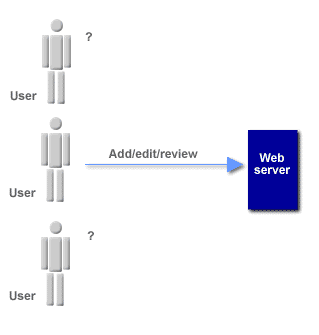
This is a worst-case scenario. In the organization there are several information producers
(users or groups of users) and everybody wants their information in the intranet.
But different people with varying skills maintain the intranet.
Only users who know how to publish the information will do it.
This is a static intranet; a dead intranet. Or it is an active intranet; unorganized intranet.
It is also a possible source of security problems.
Several users/groups, one webmaster (or web team).
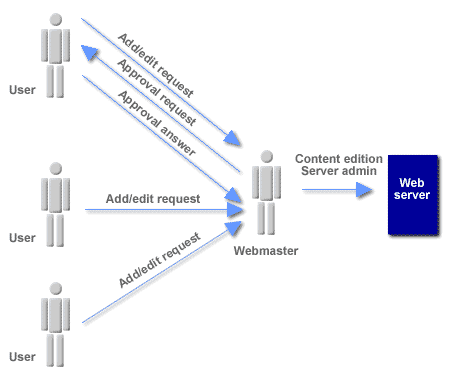
This is a typical scenario. In the organization there are several information producers
(users or groups of users) and everybody wants their information in the intranet.
To publish the information they contact the webmaster to edit some content.
The webmaster makes the changes and then ask the user to review the changes.
If a mistake was done, a new request to fix is done.
The webmaster (or web development team) is overwhelmed with requests that are put in a
queue. The priority problems arise (my request is more important than yours).
Cost is multiplied because of the extra transaction cost with each request (this cost is higher
if your web-related tasks are being outsourced).
The process path is longer and more prone to error.
The web server administration tasks are delayed. And there is a single point of
failure for the entire organization. This scenario doesn't scale.
Several users/groups, one webmaster (or web team) and a reviewer(s).
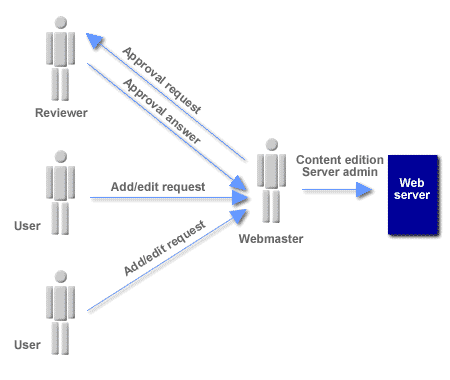
The scenario is similar. Now a different user does the review task. This may reduce the
errors rate but doesn't solve the problems with the single point of failure, priorities and
cost of transaction. Actually, if the web jobs are being outsourced, the transaction cost
may be higher.
Several users/groups, one webmaster (or web team), with the Content Management module.
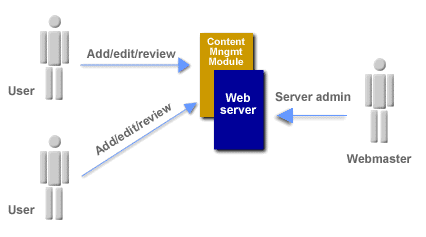
Now the users (or groups of users) control their content. They edit, review and publish
their information in the intranet. And to do it they don't need to know HTML or have any
technical skill. If they can use a web browser, they can publish content in a secure way.
Because the users are in control, they can schedule their updates;
no more delays and priorities problems. The cost of transaction is gone.
The mistakes are reduced and if some are found, the owners of the information can fix them.
There is no single point of failure.
The webmaster now have time for more important tasks.
Several users/groups, one webmaster (or web team), a reviewer(s) with the Content Management module.
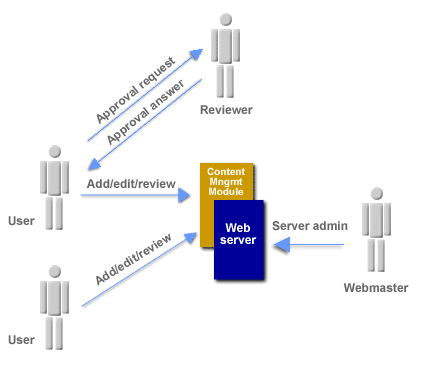
Similar scenario. With the reviewer the transaction cost is still there, but this cost is spread across the users
and don't lie in the webmaster-reviewer/webmaster-user interactions. If the web jobs are outsourced this results in a
great cost saving.
Several users/groups, one webmaster (or web team), with the Content Management module, being adapted by a developer (or development team).
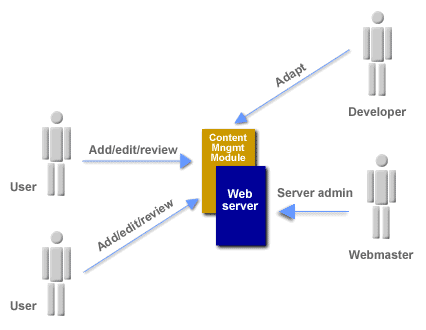
Thanks to the open source nature of the CMS module, you can adapt and evolve your solution
according to your needs. Your developer or development team (internal or oursourced)
can modify the source code of the CMS module reducing the cost of ownership and increasing
the flexibility of your intranet.






